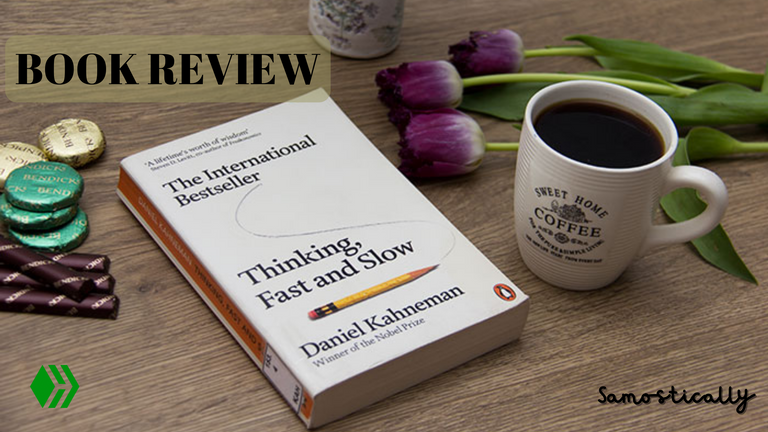It is that point in life, that point where a lot of things don't make sense.
Sometimes you feel like you are being punished by the universe.
Your thoughts are a constant mess.
I am in constant battle with my demons.
However, if I'm to come out victorious in this battle, I need to know how to. For this reason, I have spent the last few weeks devouring books- Non-fiction-Productivity-Finanace.
Today I'm excited to share my review of: Thinking, Fast and Slow by Daniel Kahneman, a book that offers insights into the way we think and make decisions, helping readers to better understand their thought processes and make more informed choices.

Image Source | Edited with Canva
About "Thinking, Fast and Slow" by Daniel Kahneman
"Thinking, Fast and Slow" is a book that explores the way our minds work and how we make decisions. Written by Nobel Prize-winning psychologist Daniel Kahneman, the book is a must-read for anyone interested in understanding human behavior and decision-making.
In this book review, we will explore some key ideas presented in "Thinking, Fast and Slow."
The Two Systems:
The primary concept of Kahneman's work is that our minds are divided into two independent systems: System 1 and System 2.
System 1 is quick, intuitive, and automatic, whereas System 2 is intentional, sluggish, and laborious. According to Kahneman, we frequently depend too much on System 1 thinking, which can result in errors and biases in our decision-making. He demonstrates how these biases can affect everything from financial decisions to personal relationships.
The Illusion of Rationality:
Kahneman also questions the notion that humans are completely rational creatures. He shows that our minds are susceptible to various cognitive biases, such as the availability heuristic, confirmation bias, and the halo effect. These biases can lead to erroneous judgment and decision-making, which can have major effects on our lives.
The Power of Intuition:

What is intuition?
It is the ability to understand something instinctively, without the need for conscious reasoning.
This is a very important concept even in the game of Chess. As you progress as a chess player and become stronger, so does your intuition - your ability to make good moves based on instinct.
Intuition, however, those not apply only to chess, but to every other field in life.
Kahneman acknowledges this in the book as he explains that experts in various fields, from firefighters to chess players, develop good intuition through years of practice and experience.
By developing strong intuitions, these experts have developed mental models or "chunks" that allow them to quickly recognize and respond to patterns in their environment. These mental models are formed through a combination of practice and feedback and allow experts to make quick and accurate decisions.
However, Kahneman also cautions that intuition can be unreliable when it is based on incomplete or inaccurate information. He argues that to develop good intuition, it is important to have a deep understanding of the subject matter and to continually seek feedback and refine mental models.
Overall, Kahneman's view of intuition is that it is a valuable tool, but one that must be developed through experience and practice. Good intuition requires a deep understanding of the subject matter and the ability to quickly recognize and respond to patterns in the environment.
The Importance of Framing:
Kahneman delves into the concept of framing, which refers to how we are presented with information. He demonstrates how the same information may be delivered in many ways, resulting in diverse effects. A medical procedure, for example, may be advertised as having a 90% success rate or a 10% failure rate. People may make various conclusions depending on how the information is presented.
To conclude, here are some of my key takeaways from the book:
Our minds operate in two distinct systems: System 1 and System 2. System 1 thinking is fast and automatic, while System 2 thinking is slow and deliberate.
We often rely too heavily on System 1 thinking, which can lead to errors and biases in our decision-making.
Our minds are subject to various cognitive biases, including the availability heuristic, confirmation bias, and the halo effect.
Despite these biases, intuition can be a powerful tool when it is based on a deep understanding of the subject matter and a wealth of experience.
The way information is presented to us can influence our decision-making. This is known as the framing effect.


I am @samostically,I love to talk and write about chess because i benefited alot from playing chess. I love to review books and movies too!.I believe life is all about staying happy and maintaining peace.
♟♟♟♟♟♟♟♟♟

The rewards earned on this comment will go directly to the people( @topzone ) sharing the post on Twitter as long as they are registered with @poshtoken. Sign up at https://hiveposh.com.
Congratulations @samostically! You have completed the following achievement on the Hive blockchain And have been rewarded with New badge(s)
Your next target is to reach 27000 upvotes.
You can view your badges on your board and compare yourself to others in the Ranking
If you no longer want to receive notifications, reply to this comment with the word
STOPCheck out our last posts:
Support the HiveBuzz project. Vote for our proposal!
There is reasonable evidence that this article is machine-generated. Posting such content is considered fraud.
Fraud is discouraged by the community and may result in the account being Blacklisted.
Guide: Why and How People Abuse and Defraud
If you believe this comment is in error, please contact us in #appeals in Discord.